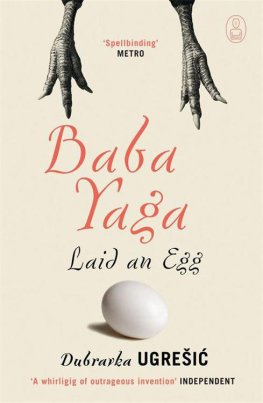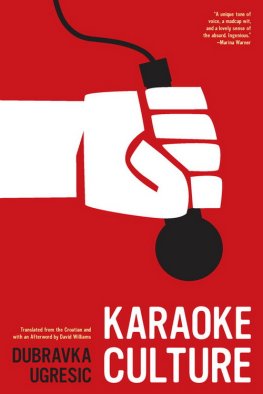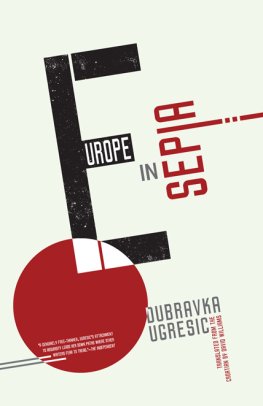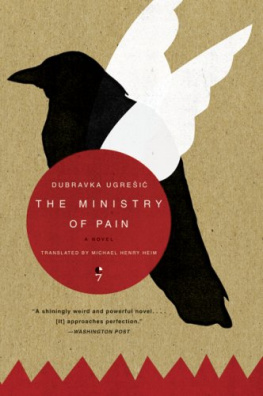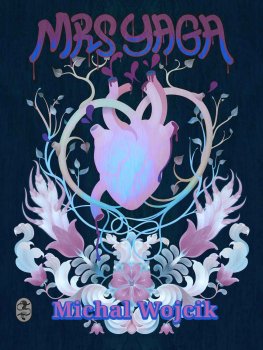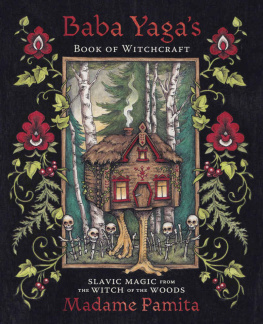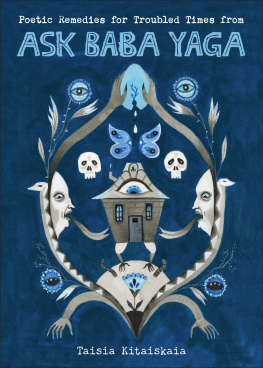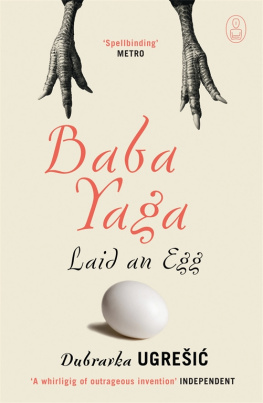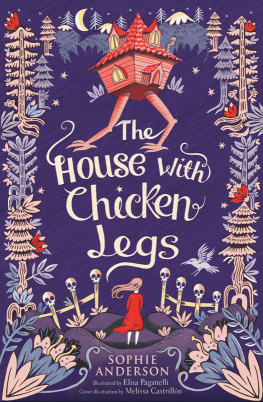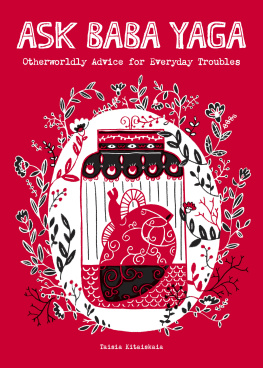Dubravka Ugrei
BABA YAGA LAID AN EGG

Myths are universal and timeless stories that reflect and shape our lives they explore our desires, our fears, our longings and provide narratives that remind us what it means to be human. The Myths series brings together some of the worlds finest writers, each of whom has retold a myth in a contemporary and memorable way. Authors in the series include: Alai, Karen Armstrong, Margaret Atwood, AS Byatt, Michel Faber, David Grossman, Milton Hatoum, Natsuo Kirino, Alexander McCall Smith, Toms Eloy Martnez, Klas stergren, Victor Pelevin, Ali Smith, Donna Tartt, Su Tong, Dubravka Ugrei, Salley Vickers and Jeanette Winterson.
At First You Dont See Them
You dont see them at first. Then suddenly a random detail snags your attention like a stray mouse: an old ladys handbag, a stocking slipping down a leg, bunching up on a bulging ankle, crocheted gloves on the hands, a little old-fashioned hat perched on the head, sparse grey hair with a blue sheen. The owner of the blued hair moves her head like a mechanical dog and smiles wanly
Yes, at first they are invisible. They move past you, shadow-like, they peck at the air in front of them, tap, shuffle along the asphalt, mince in small mouse-like steps, pull a cart behind them, clutch at a walker, stand surrounded by a cluster of pointless sacks and bags, like a deserter from the army still decked out in full war gear. A few of them are still in shape, wearing a low-cut summer dress with a flirtatious feather boa flung across the shoulders, in an old half-motheaten Astrakhan, her make-up all smeary (who, after all, can apply make-up properly while peering through spectacles?!).
They roll by you like heaps of dried apples. They mumble something into their chins, conversing with invisible collocutors the way American Indians speak with the spirits. They ride buses, trams and the subway like abandoned luggage; they sleep with their heads drooping onto their chests; or they gawk around, wondering which stop to get off at, or whether they should get off at all. Sometimes you linger for a moment (for only a moment!) in front of an old peoples home and watch them through the glass walls: they sit at tables, move their fingers over leftover crumbs as if moving across a page of Braille, sending someone unintelligible messages.
Sweet little old ladies. At first you dont see them. And then, there they are, on the tram, at the post office, in the shop, at the doctors surgery, on the street, there is one, there is another, there is a fourth over there, a fifth, a sixth, how could there be so many of them all at once?! Your eyes inch from one detail to the next: the feet swelling like doughnuts in the tight shoes, the skin sagging from the inside of the elbows, the knobby fingernails, the capillaries that ridge the skin. You look closely at the complexion: cared for or neglected. You notice the grey skirt and white blouse with the embroidered collar (dirty!). The blouse is worn thin and greyed from washing. She has buttoned it up crookedly, she tries to unbutton it but cannot, her fingers are stiff, the bones are old, they are getting light and hollow like bird bones. Two others lend her a hand and with their collective efforts they do up the blouse. Buttoned up to her chin, she looks like a little girl. The other two smooth the patch of embroidery on the collar, cooing with admiration, how far back does the embroidery go, it used to be my mothers, oh, everything used to be so right and so pretty. One of them is stocky, with a noticeable bump on the back of her head; she looks like an old bulldog. The other is more elegant, but the skin on her neck hangs like a turkeys wattle. They move in a small formation, three little hens
* * *
At first theyre invisible. And then all at once you begin to spot them. They shuffle around the world like armies of elderly angels. One of them peers into your face. She glares at you, her eyes wide, her gaze a faded blue, and voices her request with a proud and condescending tone. She is asking for your help, she needs to cross the street but she cannot do it alone, or needs to clamber up into a tram but her knees have buckled, or needs to find a street and house number but shes forgotten her spectacles You feel a pang of sympathy for the old lady, you are moved, you do a good deed, swept by the thrill of gallantry. It is precisely at this moment that you should dig in your heels, resist the siren call, make an effort to lower the temperature of your heart. Remember, their tears do not mean the same thing as yours do. Because if you relent, give in, exchange a few more words, you will be in their thrall. You will slide into a world that you had no intention of entering, because your time has not yet come, your hour, for Gods sake, has not come.
PART ONE
Go There I Know Not Where and Bring Me Back a Thing I Lack

Birds in the Treetops Growing by My Mothers Window
The air in the New Zagreb neighbourhood where my mother lives smells of bird droppings in summer. In the leaves of the trees out in front of her apartment building jostle thousands and thousands of birds. Starlings, people say. The birds are especially raucous during humid afternoons, before it rains. Occasionally a neighbour takes up an airgun and chases them off with a volley of shots. The birds clamour skywards in dense flocks, they zigzag up and down, exactly as if they are combing the sky, and then with hysterical chirruping, like a summer hailstorm, they drop into the dense leaves. It is as noisy as a jungle. All day long a sound curtain is drawn, as if rain is drumming outside. Light feathers borne by air currents waft in through the open windows. Mum takes up her duster, and, mutter ing, she sweeps up the feathers and drops them into the bin.
My turtledoves are gone, she sighs. Remember my turtledoves?
I do, I say.
I vaguely recall her fondness for two turtledoves that came to her windowsill. Pigeons she hated. Their muffled cooing in the morning infuriated her.
Those repulsive, repulsive fat birds! she said. Have you noticed that even they have gone?
Who?
The pigeons!
I hadnt noticed, but sure enough, it seemed that the pigeons had fled.
The starlings irked her, especially their stink in the summer, but in time she reconciled herself to them. For, unlike other balconies, at least her balcony was clean. She showed me a messy little spot near the very end of the balcony railing.
As far as my place is concerned, they are filthy only here. You should see Ljubicas balcony!
Why?
Hers is caked all over in bird shit! says Mum and giggles like a little girl. A childs coprolalia, clearly she is amused by the word shit. Her ten-year-old grandson also grins at the word.
Like the jungle, I say.
Just like the jungle, she agrees.
There are jungles everywhere these days, I say.
Birds are apparently out of control; they have occupied whole cities, taken over parks, streets, bushes, benches, outdoor restaurants, subway stations, train stations. No one seems to have noticed the invasion. European cities are being occupied by magpies, from Russia, they say; the branches of trees in the city parks bow down under their weight. The pigeons, seagulls and starlings fly across the sky, and the heavy black crows, their beaks open like clothes pegs, limp along over the green city swards. Green parakeets are multiplying in the Amsterdam parks, having fled household birdcages: their flocks colour the sky in low flight like green paper dragons. The Amsterdam canals have been taken over by big white geese, which flew in from Egypt, lingered for a moment to rest and then stayed. The city sparrows have become so bold that they wrest the sandwiches from peoples fingers and strut brazenly about on the tables in outdoor cafs. The windows of my short-term lease flat in Dahlem, one of the loveliest and greenest of the Berlin neighbourhoods, served the local birds as a favourite repository for their droppings. And you could do nothing about it, except lower the blinds, draw the curtains or toil daily, scrubbing the splattered window.

